
In this video newsletter, I interview Jon Dufresne and Manuel Gomez, two experts in the firearms industry, to get the facts and truth about gun safety, gun laws and gun control.
Jon is the owner of Kinetic Consulting, a training and consulting firm and he’s a former U.S. Army Ranger, 3rd Battalion, 75th Ranger Regiment. Jon travels around the country training, consulting and instructing civilians, and Federal, State and local law enforcement agents and some military units on firearms.
Manuel Gomez is the owner of Palm Beach Tactical, a Class III NFA Dealer and an expert on gun laws, the background check process and all types of firearms and accessories.
COREY: Today, we’re going to talk about all kinds of different things in the gun industry. We’re going to talk about laws, we’re going to talk about suppressors, machine guns, and we’re going to go through a whole list of questions, because obviously this is a topic that is constantly in the news, and people are always talking about it.
First off, we’ll start with John. Give everybody a little background on who you are, where you come from and your expertise.
JON: Glad to be here. First off, my name is John Dufresne. I’m a former Ranger. I also work in the security industry and have been for about seven years. I am the owner of Kinetic Consulting, which is a training and consulting company. I go around the country teaching civilians, law enforcement, federal and local, then some military units as well. Corey’s been a student for almost a year.
MANUEL: My name is Manuel Gomez. I’m the owner of Palm Beach Tactical. We are a concierge gun shop in Boca Raton, Florida specializing in unique high-end firearms and accessories. This shop has been a dream of mine since I was a little boy. When other kids were out playing ball, I was out shooting. It is truly my passion. And we are South Florida’s premier purveyor of night vision and thermal equipment.
COREY: And you’re also the MPX king of South Florida, right?
MANUEL: Undisputed MPX king of South Florida.
COREY: For the people that don’t know, what is an MPX?
MANUEL: MPX is a Sig Sauer 9mm pistol caliber carbine, or PCC. So it kind of looks like an AR15, it operates like an AR15, it shoots 9mm and they are small and portable. They are considered handguns, so a lot of fun.
COREY: Yes, and I have one with a suppressor, which is really cool.
MANUEL: And it’s the Coach Corey Wayne special. It’s a very special model that we did for Coach Corey.
COREY: Yeah, on my Instagram account, we actually did a couple of videos where we actually went to the gun range, because he’s got one. Obviously, he’s a Class III manufacturer, so he manufactures machine guns, and I got to shoot his MPX machine gun on the gun range, which was a lot of fun.
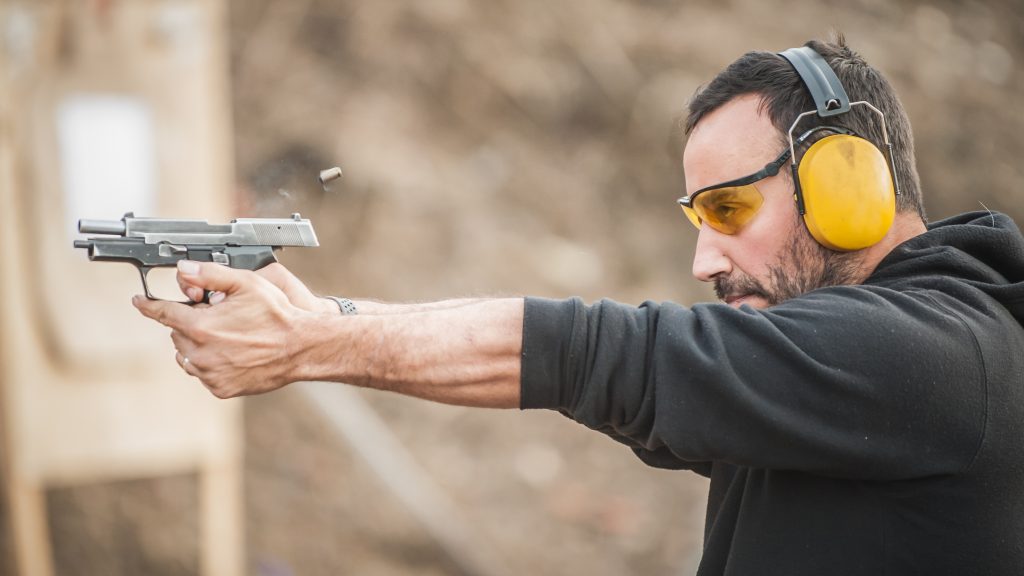
COREY: So with that said, I have a list of questions we’re going to go through and facilitate discussion. The first one is, how did pop culture, movies, video games and childhood inspired your love of guns?
JON: For me, it started out as, I was raised by Army soldiers and I was raised by Marines, so it was easy to get to know and love those things. As a kid I always had the fascination of it, so it wasn’t something that happened at 10 years old. I shot my first gun at 4 or 5. It was a little 22 rifle, my grandpa let me shoot at little cans. And it was a fascination from there. I was hooked. Something movie-wise that I really enjoyed was something like the Navy Seals. Rambo was always a thing. I used to run around with a little bandana. It was entertainment, but most of all it drew me to the military.
MANUEL: I would have to say Arnold Schwarzenegger and Sylvester Stallone movies, classic action heroes. Real men, real tough guys, real badasses. It doesn’t get any better than them.
COREY: John, what made you decide to become a soldier?
JON: Like I said, I was raised by a bunch of them in different forms and fashions, but mainly it was kind of like the want to serve my country. I’ve always been one to be helpful. I have six younger siblings, so I tried to be helpful to my parents. I thought, and I still think, it’s something most people should do. At least try. And then also, I wanted to pay for college. That was a secondary thing other than my service.
I definitely wanted to experience the things that many don’t get to experience. I think they say like 1% of the population joins the military in the United States, and 1% of the 1% end up in a Special Operations community. So, not only was it something I can be proud of and feel honored to do, but it was definitely something that was fun. I really enjoyed it.
COREY: Did you feel like it was your calling? Like you felt inside, this is what I’ve got to do?
JON: Oh yeah. Ever since I was a little kid, I had little camouflage outfits dressed up for Halloween. It was definitely where I was going. And I went to EMT school right before the military, and it was one of those things where I was like, I’m in the wrong place. Like, I feel like I’m in the wrong place. And it’s not because it was EMT school, because it was great learning a lot of good knowledge, a lot of stuff I still use today, but it was not where I needed to be, and I felt that.
I joined the military, and I knew immediately when I got there that 1) the recruiter lied to me, and 2) that it was the right place, like I was on the right path. So it was really cool.
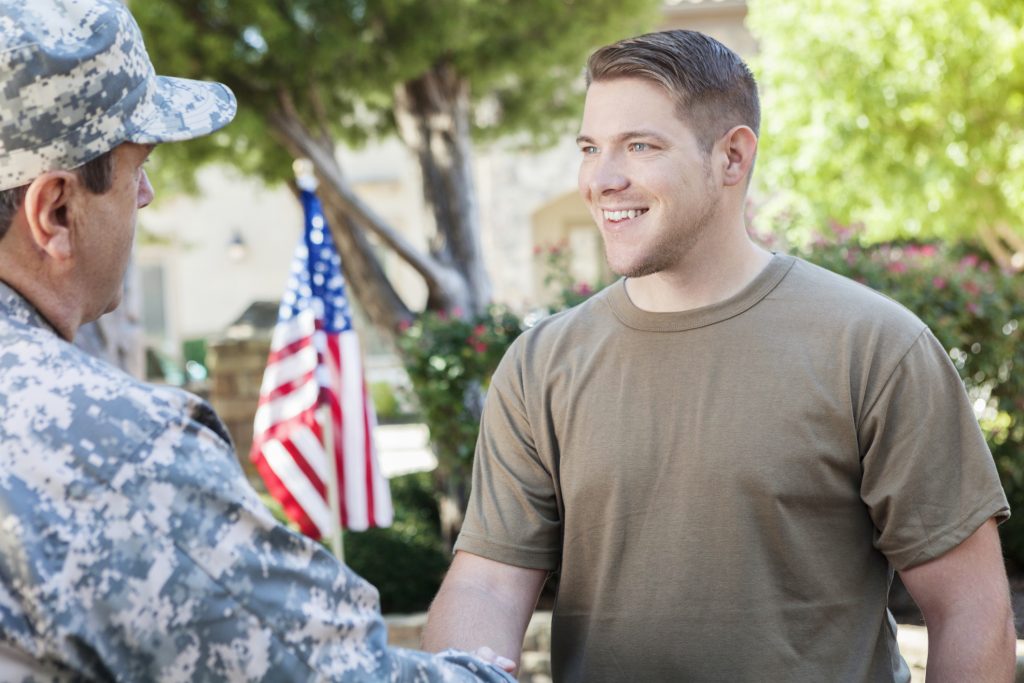
COREY: What was the lie that he lied to you about?
JON: Oh you know, all the recruiters lies, like “Oh, you’re going to be a man amongst men. It’s gonna be awesome. You’re gonna be a badass” — all of the things that they want you to know. And then you get there and the drill sergeants are just on you immediately and tear you down and treat you like crap. I kind of expected it from either the movies or what I’ve heard from friends or the relatives I had growing up, but it was like, this guy totally lied to everybody. And there are plenty of guys out there watching this that will definitely like, “Yup. My recruiter lied.”
COREY: What insight does being in an experienced war fighter give you now that you’re a civilian that everybody needs to know or understand about guns and self defense?
JON: Experienced war fighter is probably the wrong term for it. I have some experience. There are guys that have way more experience than me, guys that have less than me. I’m in there as experienced to an extent. But, I think people don’t understand that we went over there, we still are over there, using firearms to protect ourselves and our buddies. Because those are the most important things obviously for our country.
Over here, we still use the same firearms to protect ourselves from evil humans. There’s always going to be evil. There’s always going to be bad people. Most may not want to think that way or to believe that way, but there’s evil. And one of the things I think people misinterpret is the use of the firearm. It’s not that the firearm is what gives you the self defense ability. It’s you that gives you the self defense ability — your mind, your way that you deal with things. It’s just a tool. It’s an added value to that situation.
It can also be the downside to you if you don’t use it correctly. But one of the things that also gets involved in there is, as a person that carries a firearm, you need to know how to use it, you need to know how to take care of it, and you need to know how to store it properly and not let it get into hands that are not supposed to be on it and stuff like that. It’s the same thing we dealt with overseas. You pretty much slept with your firearm, you made sure it didn’t get into the wrong hands, you took care of it, and you knew how to use it. So the same things translated to the civilian population — different gun and different way of carrying it, because now it’s not just slung around my shoulder. It’s in a holster, concealed by clothing. So, it’s different, but the same.
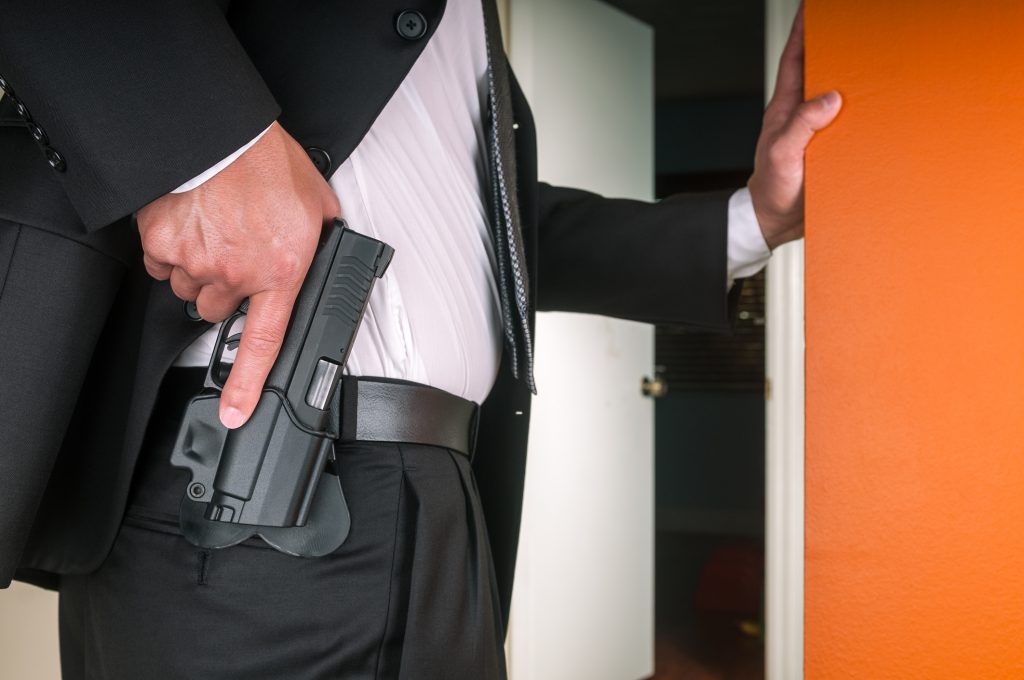
COREY: So, as a professional firearms trainer, what level of gun regulations, in your humble opinion, do you think is appropriate? And to add to that, what about mental illness and how you think that should be handled, or the red flag laws?
JON: Personally, the gun laws that are out there, we have to think of them as, the only people that are going to follow laws are law abiding citizens, and law abiding citizens are usually not criminals, because those are kind of the opposite. So, being that most law abiding citizens follow the laws, the laws work. When people that are not law abiding citizens, or criminals, they don’t care. So really, laws are just there for the people that follow them.
It’s like a lock. A lock on your door is easily defeated. Anybody can get in your house. All they need is a couple of tools or a really good kick most of the time. And the only thing that lock does is keep honest people out. It doesn’t keep dishonest people out. So it’s the same concept. Whatever laws go into place, they have to be followed to actually work. If they’re not followed by the people that don’t follow laws, that they were made for, what’s the point?
So personally, I don’t think there should be any. It’s not helping. It’s not doing anything for anybody. The minimal amount of statistics where laws actually catch people is so minuscule. There’s a very small statistic where you have these people actually go into a gun shop, have a felony, and get caught by the system. Then that same person just goes and steals one. Same concept. Laws are for there for the law abiding citizen. So if you’re going to follow them, great. If you’re not, well they don’t matter then.
COREY: Yeah, a lot of politicians have the idea that you can legislate a perfect society if you just write the right number of laws, but the thing they always ignore, look past, is that the criminals just have zero intent on following them. What’s your opinion on red flag laws?
MANUEL: It’s a very touchy subject. I feel that a lot of these laws that are in place, anyone that has an established history of some type of mental disorder or tendencies like that, well obviously they can’t get guns, but what about for example if I’m on my way home, and I get a phone call that my daughter has been killed in a car accident? I may become temporarily insane. I may not be the person that I was before. It could cause me to do something that I normally wouldn’t do, but ten minutes before that call I was normal. I was not a threat to anyone or anything.
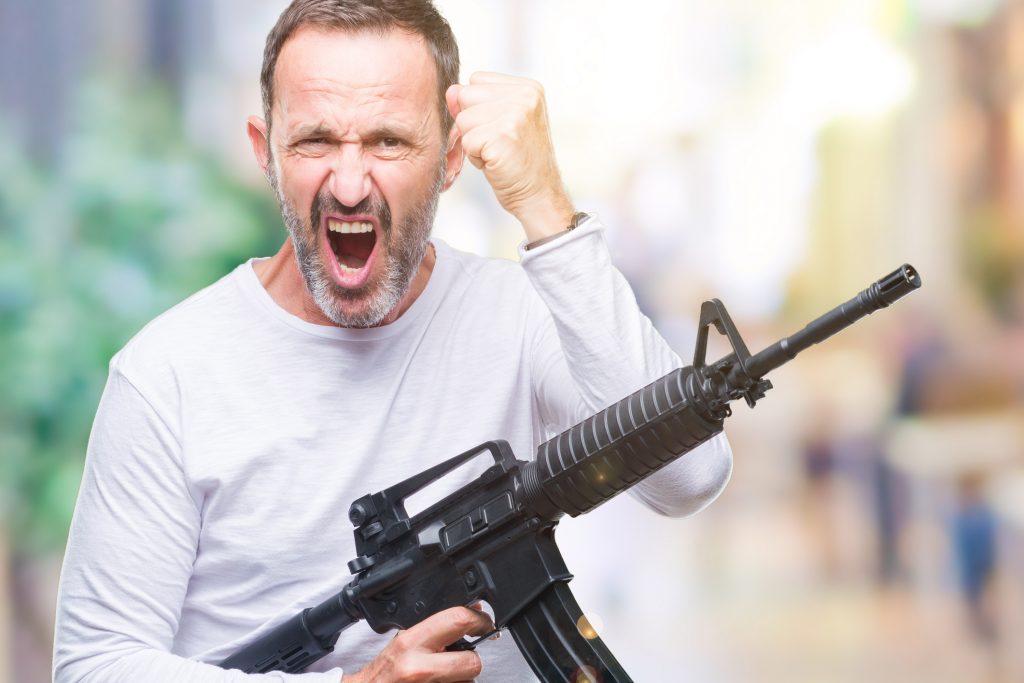
COREY: So, you’re a fan of the red flag laws? Because obviously the argument is, they get abused. You’ve got spouses that are pissed off at their exes, and they’re trying to use the legal system to tweak them.
MANUEL: No, I’m certainly not a fan of the red flag laws. And as you said, yes they can be misused and abused, and guns could be taken away from the wrong person who was doing everything right and did not have any mental illness or issues.
COREY: So, let’s talk about at risk individuals and having their guns taken away — somebody that’s mentally ill or somebody that’s threatening to shoot somebody or shoot something up. What’s your opinion on that? Or having law enforcement go and forcibly remove the guns from that person?
JON: Well, it depends. It’s a slippery slope, because if the person’s at risk, they’ve threatened people — that’s already breaking laws by the way, when you start threatening humans — so technically, it’s definitely already a crime. So that may be an instance where it would be taken away, or at least investigated. That person, in our litigious society, needs to be confronted about it.
Now, the problem is, how do we know they made that treat? Is there proof of the threat on social media where they typed it in? But was that them typing it in, or was it somebody that was angry about them with their account information typing it in?
COREY: Like a disgruntled spouse or an ex-spouse to be.
JON: Right. Just like with the red flag laws. So, there are so many what ifs that can go into it. It’s hard to make a law that’s going to cover every what if. And then if they make a blanket statement law, it may put people that aren’t supposed to be getting their guns taken away getting their guns taken away for nothing. So, I don’t know how to put it any better. It’s a slippery slope.
COREY: What do you think about the calls for the AR15 to be banned, because that’s obviously pretty universally demonized in the media. It’s like every time you turn it on, somebody’s bitching about the AR15.
MANUEL: I think they’re ridiculous. I think there’s no logic behind that argument. That’s like saying, there are more deaths from drunk drivers and drug overdoses in the US than there are gun-related deaths, so if that were the logic, why don’t they ban cars? Or for that matter, why don’t they ban alcohol? Or why don’t they ban prescription drugs? It’s a ridiculous thing.
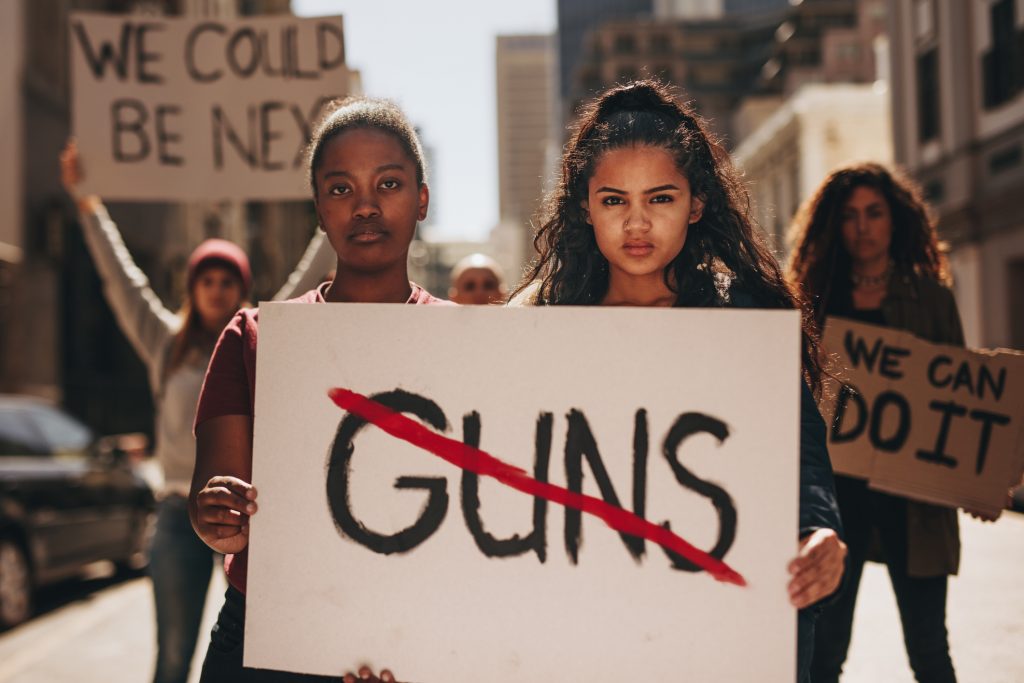
COREY: They did ban alcohol at one point. It didn’t work out too well.
JON: And look what happened.
MANUEL: The AR15 is just a tool and it all depends on how it’s used.
COREY: When you look at Mexico, because Mexico is in the headlines all the time now, I think there’s two gun shops in all of Mexico, and so only the government and the criminals are armed. And the people have no way to defend themselves. And you know, they’re right on our border, and you’ve got those same people coming across the border with impunity. And you get these calls to just disarm everybody, and that will solve all the problems. And it hasn’t worked, especially there.
COREY: So what do you guys think about the call for the assault weapons ban? What is an assault weapon, and the silliness around it? Because most of the people discussing it are completely ignorant of the weapons they’re talking about.
JON: Well, it’s a buzzword, because a weapon is a weapon. But anything can be a weapon, right? So, bottle, [pretends to hit Manuel with bottle], I assaulted him. [Holds up bottle] Assault weapon.
It doesn’t matter. They can buzzword all they want. It’s just like marketing. They’ll use wiz-bang words to make you buy things. It’s a buzzword. There’s no real assault weapon.
MANUEL: I think the media also uses the term assault weapon to instill fear in people who don’t know enough about the subject or who have a misconception of it, so they’re using it incorrectly.
COREY: What do both of you guys recommend that people do to become safe and competent firearm users and owners.
JON: That’s simple, go learn. Go take professional courses from somebody you have vetted. There’s a lot of instructors out there that are self-taught or have no experience or just have an NRA certification, and it doesn’t mean crap. It means absolutely nothing. If they’re just sitting there giving you theoretical based knowledge that they learned from a book or from Rambo, then there may be some issues there.
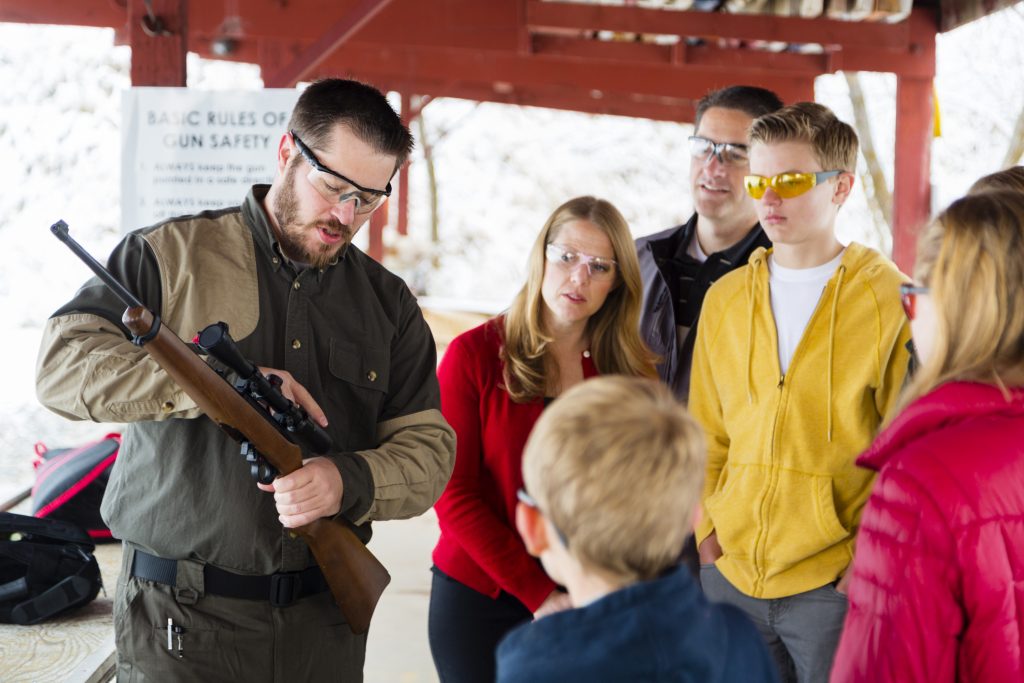
You need to also learn the laws. Learn what you can and what you can’t do, and learn when you are allowed to and understand that, but also protect yourself in that sense legally. You need to understand legally what you’ll have to do after you end up having to use your firearm in self defense or something like that. If you don’t understand those things, how to use a firearm, when to use a firearm and legally what’s going to happen afterwards, you’re going to end up somewhere getting hung up in some kind of issue.
We’re a very litigious society that likes their laws. Although you may have been very rightfully using your firearm to protect yourself or somebody else, that person’s going to sue you somehow. In death, that person’s family will sue you. That person, when they get out of the hospital, if they lived, are going to sue you. Just bet on it.
So if you’re one of those people that’s like, well I’d rather get judged by twelve than buried by six, shut up. Your bravado doesn’t matter. Your bravado is not going to help you. And I promise you being judged by twelve is going to suck. It’s going to definitely suck. And being buried would have been way easier. Don’t go dying. But one of the things that people don’t understand is the people they put on those juries. They don’t know about guns. They don’t know about the gun laws.
If we look at it with the way our country is, they probably are against guns. And the other thing is, that family that’s going to sue you, or that person that’s going to sue you is going to make the most dramatic case out of it. Tons of shootings that are out there, people that I’ve dealt with have had to refinance their house, or give up their house, or any of the other things, just because they protect themselves in their home. It’s ridiculous and not necessary, but it happens. If you don’t understand when you can, how to do it and also the laws behind it, you may stick yourself into a really bad corner. Training.
COREY: So what should people look for in a trainer? Obviously people are all over the country and the world, so not everybody has a retired Army Ranger near. So what’s the vetting process? What criteria do you look for for somebody to train with?
JON: One of the things I look for personally, because I’m still a student all the time, is that person’s reputation. If they’re just some guy that says something from some special place, how? Go back, look them up, look up stories about them, articles about them. There’s a lot of after action reports online about instructors. All you have to do is look up their name usually, and you can find something about them.
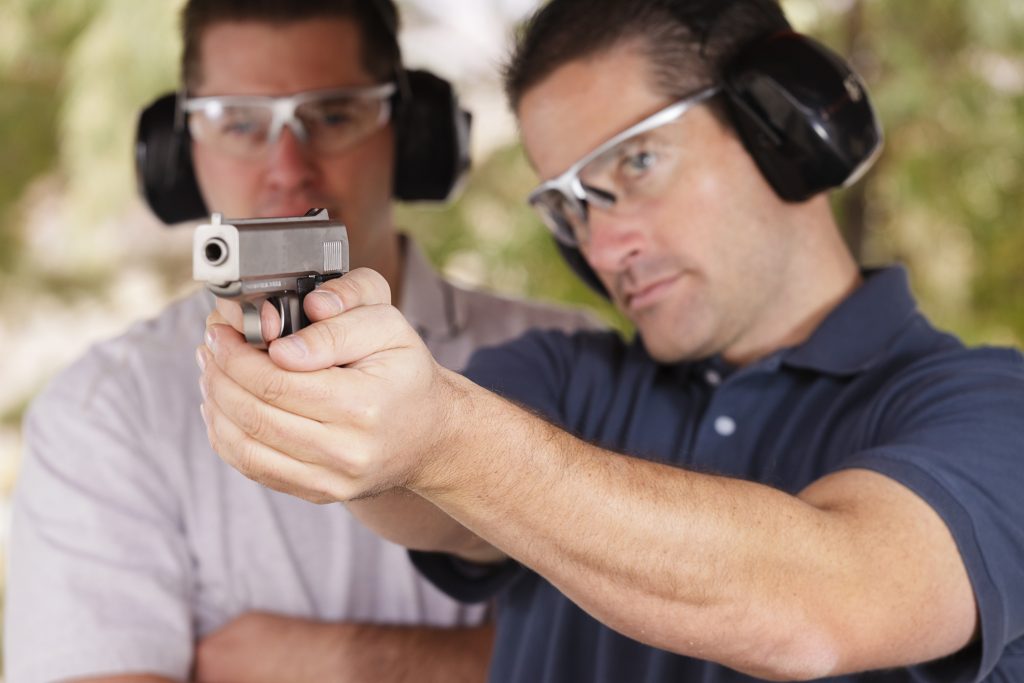
The other thing is, ask. Ask other people. Ask people that you know that are avid trainers or you could easily email me, and I’ll tell you I know that guy, or I don’t know that guy. The other thing is too, most shops will have a reputable trainer that they use or know, but understand that they may be biased. That trainer may not be the best or a great trainer, and that shop just uses them because they’re convenient. So just be aware of those kinds of things.
Also, just do your research on them. Go to their website, read their bio, look up different videos. Nowadays, every instructor has videos online. Look at their videos, see how they’re shooting, what they’re doing. If it looks unsafe and really wonky, they’re probably not good. And here in South Florida, not to name any names, but there are plenty of instructors down here that are way out of their realm. It is what it is. There’s no way of regulating that.
Anybody can teach anything. You just have to have the students that come. It’s one of those scary things that I tend to have a lot of students that come to me from other instructors and not know how to shoot, and all they’re doing is now relearning or taking bad habits and having to remake them into better habits. It’s sad, but it’s what we live with right now with so many people out there with fake resumes and just bad training.
COREY: What do you guys think about our society that leads to alienated people who commit mass shootings? In other words, what’s changed in our society that’s caused this relatively new phenomenon of mass shootings in your opinion?
MANUEL: That’s a difficult question to answer.
COREY: I mean, when my parents were growing up, I listened to my dad tell stories all the time, he was like, yeah, you could just go down to the local hardware shop and buy a revolver or a rifle. It was like buying a hammer or a chisel or a screwdriver. It wasn’t a big deal, and you didn’t have people committing mass shootings and stuff.
JON: I think it’s partly like how we treat our kids nowadays. It has to stem from when we we’re kids, in my opinion at least. When I was a child, I was taught discipline. This is good, this is bad, and don’t do this, do this. And nowadays we have families that have two working parents, the kids are kind of on their own for the most part, or they’re just being taught by other kids in school.
A lot of kids don’t talk to their parents nowadays. They don’t have conversations with them. They’re like, “Oh how was your day?” “Oh, good.” That’s it. There’s no, “Mom, there’s this kid at school. He did this and I didn’t feel good.” Then the parent needs to teach them how to deal with those situations. Instead, the kid sits there, bottles it up, and says “good” every single time it’s asked, and then he eventually loses his shit.
I think the other problem is how the media makes it a spectacle. The kids that are usually being bullied into this, and I say bullied because most of them are probably bullied one way or another…
COREY: They’re kind of like the outcasts. Like when we go back to the Columbine one, it was pretty obvious they were both bullied and ostracized.
JON: Even the most recent ones were usually bullied in some way, whether it’s because girls don’t like them, or because other people don’t like them in general. They’re set aside and they feel a certain way, and they don’t feel safe about talking to anybody about it. And that’s where the parents are supposed to come in, by the way, not some school system. Those are random people. The person that cares about the child the most should be the one that’s on top of it the most.
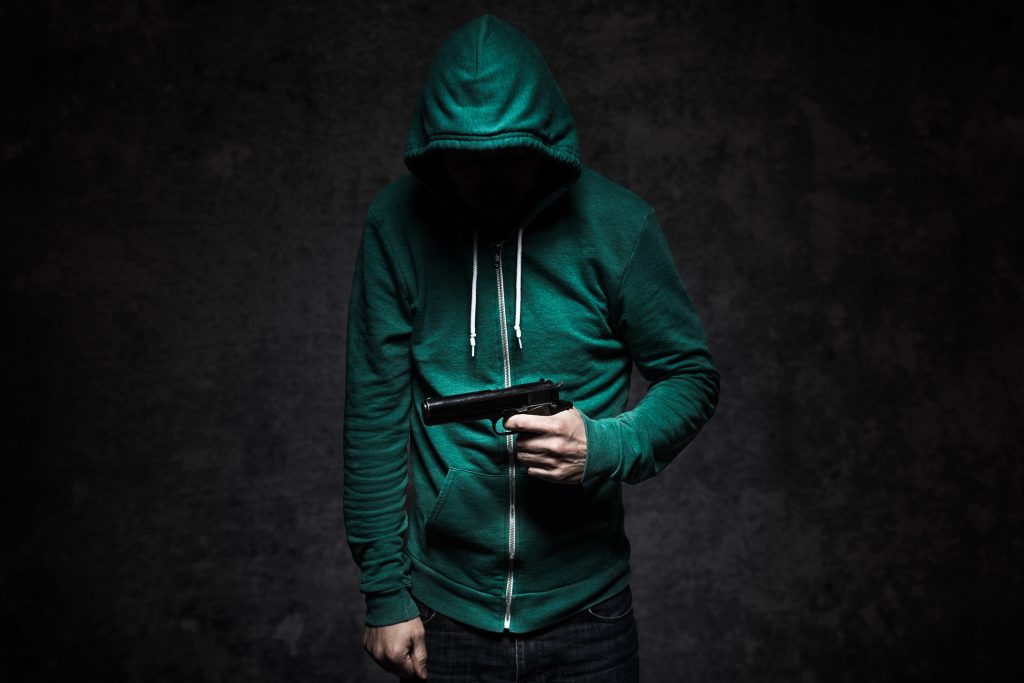
Then right there, you kind of grow this whole thing of the kid losing his shit because he doesn’t have an outlet. He knows the only way to get attention is to do something outrageous, whether it is blow up a damn car or going to a school with a gun and shoot some kids, or whatever. He’s at his boiling point at that point.
And there’s plenty of signs of it, not that we can see them all. And with teachers, it’s hard because they have 200+ students a day that they see coming through their classrooms. They can’t be expected to understand each one. And not only that, but talk to each one. It’s almost impossible. You get counselors and psychiatrists that don’t even see that many people a day.
So it’s definitely a whole thing we have where the parents are slightly at fault for not doing their parental duty, or not having the time. And then the media for forcing that whole problem to just be put out there so openly. Not to say that we need to censor them in some way, but if we look at Canada, they don’t show the face, they don’t say the name of any person that’s ever done any massive act of violence. And I believe it’s against the law there, but you have to check that. I don’t know for sure. But you don’t see a lot of mass shootings. You don’t see a lot of mass killings there for that reason. Because those kids aren’t getting that kind of attention that they are expecting like they do here in the United States. Things like that we don’t see as much, and that’s two parts of the problem. There’s probably plenty more.
COREY: We’re in an election cycle, and several of the people running for Democratic President have come out and said basically they’re going to actually use the government, if they get elected, to confiscate certain types of weapons. What do you guys think would happen if they tried to take guns from people, whether it’s pistols, rifles, an outright ban, everything? And what do you think would happen if they succeeded?
Because the numbers are over 300 million guns in the United States, and the thing you’ve got to keep in mind is guns have been part of our history for so long. I know in my own family, the guns got passed down from generation to generation. When my grandfather died, he had 32 different pistols. You’ve got guns that go back over a hundred years with no serial number. Nobody even knew they were out there. So that 300 and something million, that number might be off significantly. There might be a lot more than that. What do you think would happen if they passed the law and said you’ve got to turn in your AR, or you’ve got to turn in your pistol with your ten round magazine?
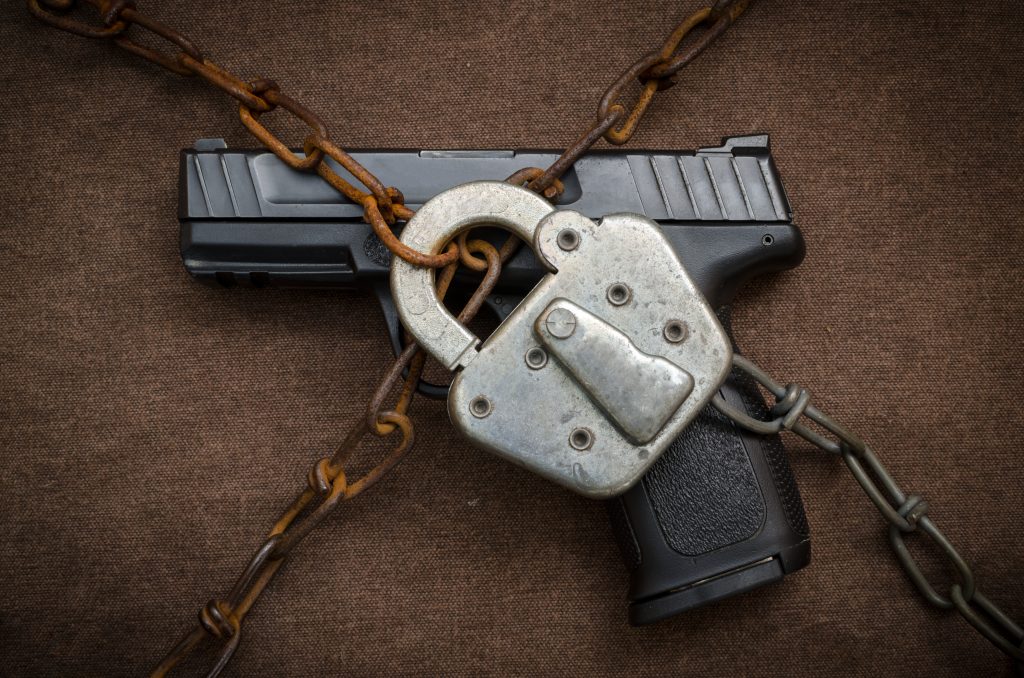
JON: A lot of people are going to lose guns by accident. “Oh, it fell off the boat!” There’s going to be plenty of those reports. Mainly, I think it may spark different things. It may spark the people that are going to outright refuse and rebel. It may spark the ones that are law abiding citizens, so they follow the laws. They’re like, okay well, I can’t have these anymore. I have to give them in. And then it may spark other countries to be like ooh la la, now they’re an easy target.
The United States for the couple of hundred years we’ve been running, people have hated us. There’s been a lot of countries on our soil, in different forms and manners, and now we have definitely a radical side of the world that hates us. And if you think the worst is going to stay at one end, you’re sadly mistaken. It’s going to constantly come further and further our way, like we were talking about with Mexico. They are right there, and there’s a bunch of people there that want their way or the highway kind of stuff. It would be bad. It would definitely be bad on the aftermath side of things.
What people won’t understand is that everybody’s going to be affected in some form or way. Whether you like guns or you don’t, it’s going to affect you. I was talking to Fort Lauderdale PD. They only have 550 officers for a couple of million people. They can’t help you bro. They’re not going to get there in time.
COREY: Fifteen minutes away.
JON: Right. They’ll clean it up. They’ll let your family know what happened. But they’re not going to be able to help you. They just won’t. So this whole confiscation stuff is going to cause a lot of issues in so many different ways.
COREY: Some of the politicians are also saying that the police are basically going to come kick your door in and take your guns forcefully. Realistically, you’ve got 550 officers over how many million?
JON: In the South Florida area, millions. Millions of people.
MANUEL: Let’s hope that day never comes.
JON: The other thing is, those officers may not do it.
COREY: What we’re seeing a lot in the news is these sanctuary gun cities now. Several of them obviously in Florida, where the city councils are passing laws saying, you can go ban all the guns you want. We’re not enforcing it. This is a Second Amendment sanctuary.

MANUEL: It’s our Constitutional right. Absolutely.
COREY: So people are, in smaller communities, fighting back. And it’s like all over the country, which I think is pretty cool. They’re saying, we’re not enforcing these laws. Everybody should have a gun.
COREY: I don’t know how closely you guys follow with what’s been going on with 3D printing. I think maybe you saw a couple of years ago the guy that printed a one-shot pistol. I think it was plastic. Like the SuperDraco thrusters on the SpaceX capsules that take off. Those things are actually made with 3D printing. So if you can build a rocket engine with 3D printing, using lasers to melt the material, 5, 10, 15 years down the road, everybody could be able to buy for $300, go to your local Office Depot, buy a 3D laser printer and you can print metallic parts at home. You can have all the gun laws you want. When you have that kind of technology out there, where anyone can print pretty much anything they want, that’s going to render all the gun laws pretty much useless other than the people who will actually follow the laws.
JON: What’s funny is, even with that people are still going to use other things. Like, anything is a weapon. Manny’s bottle here is really hard. I could beat on somebody pretty good with that.
MANUEL: A pencil.
JON: A pencil, right. John Wick, three people, one pencil. But in all seriousness, anything can be used. You’re taking away a tool. They’re just going to replace it with another tool. Look at China, no guns allowed. There’s still gun violence by the way, because they have criminals that don’t follow laws. They also have people who go on knife rampages.
COREY: That’s what’s weird over in Europe. Every couple of months you hear about some guy going in an elementary school and stabbing like thirty kids. That’s kind of bizarre how common that is.
JON: It’s sick. But people are going to use whatever they can get their hands on either way. Guns aren’t the only thing that kill people. If you look it up, FBI statistics are out there where people get bludgeoned, hammered, hit with bats, stabbed. There are people that kill people with forks. It doesn’t matter.
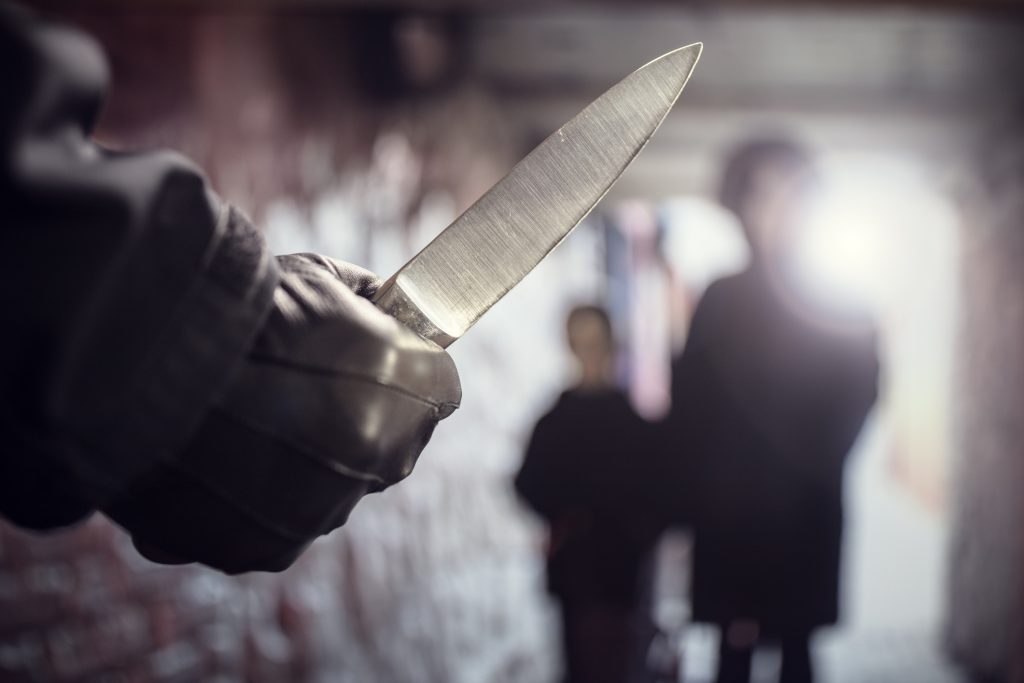
COREY: There’s only between 300 and 400 people that are killed each year by rifles, which obviously the AR15 is a rifle. And when you look at people who are killed with hands and feet or not, the numbers are three or four times knives, hands and feet versus rifles. So you figure, a few hundred people. And “it’s only about saving lives” is what they like to say, but you’ve got 11 teenagers dying every day from texting and driving. Why does nobody care about that?
JON: But they made a law about that, right? So you’re not allowed to die anymore from texting and driving. Sorry.
COREY: But yet it keeps happening.
JON: Just like drugs. Drugs have been illegal for how long? How many people overdose from drugs? Because they don’t follow the law. They don’t care about it. The law only keeps honest people honest. Other than that, it’s the wild west.
COREY: I’d like to hear from both of you individually. What is your view on the Second Amendment, its purpose, who should and shouldn’t have guns, and just the current overall gun debate?
MANUEL: Our country was founded on basically the Second Amendment, the right to bear arms, to be able to protect ourselves from a tyrannical government. To be able to protect ourselves from those trying to hurt us. And it is our right to keep and bear those arms. Simple as that.
COREY: It really has nothing to do with duck hunting and self defense. It really is a last resort to resist a government that’s become tyrannical. And when you read the words of the founding fathers, they were very explicit and very clear in their writings, that was the intent. It was such an obvious thing at the time that they really didn’t even see the need to even put it into law. And obviously, some of the other states were adamant that it be put in there.
One of the things we were discussing in the documentary, I think two of the states wanted to protect their militias to go after the escaped slaves, but the majority of them wanted it memorialized in the Constitution because the founding fathers were very familiar with all the other governments and democracies that had failed. And they wanted the people, everybody, to be armed. They even use the words, “the whole body of the American people.”
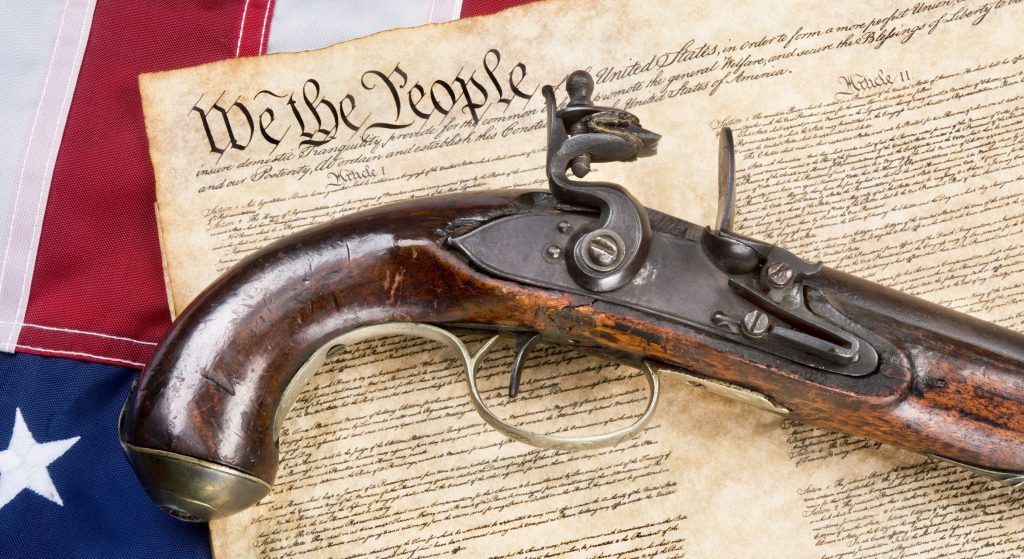
JON: I think like Manuel said, it’s literally for us to be able to bear arms. We have freedom of speech. We can say whatever we want. I can say I hate whoever I want, however I want and whenever I want. Same thing. I can own a firearm, I can go play with firearms, I go shoot wherever I want range-wise. I can do what I want with my guns. If I want to just hang them on the wall and adore them, or I want to pass them down to my kids one day, I’m allowed to do that. They’re my guns.
I understand why we have the laws and stuff, but I still think they’re, once again, just for the people that follow them.
COREY: You deal with a lot of guys in law enforcement. The guys you talk to, train and interact with, they are every day rolling around the streets in their cars. Do you have a feel for what their view on all of this debate is?
JON: It’s hard to say. I don’t really sit there and talk to them about it. They carry one because it’s a tool, part of their job. It’s a tool. They’ve got a bunch of other tools on their little Batman belts, so they have lots of options to go through before they even go into the firearm thing. one of the things I like to let them know is, the firearm, although it’s one of the pieces of equipment that you have, it’s probably one of the most important pieces of equipment to know how to use. The other ones don’t have as drastic consequences if used incorrectly.
For them, I think it’s a tool. For some of them, I know most law enforcement guys I know own multiple firearms that aren’t part of issue department stuff. It’s their own stuff, because they enjoy shooting. It’s part of their job, they should know how to, and a lot of them actually enjoy it recreationally as well. So they would have to turn in their own firearms if we had a confiscation of some sort. Their rights would be taken away as well. It doesn’t help anybody in the way I see it.
The other thing is politicians aren’t thinking this way or maybe they don’t realize it, but they may alienate themselves. They’re being protected by guys that are considered law enforcement of some sort.
COREY: What do you think about the argument that some people say that only the police should have guns?
JON: Oh, you haven’t seen police shoot. That’s, not all, but I will say the majority of them I wouldn’t want shooting around me. Because it’s, like I said, treated as a tool. It’s not treated as a responsibility or a priority in any way. It’s hard to force everybody, but the standards are very low.
COREY: Is it fair to say that there’s a lot of people in law enforcement that don’t practice enough with their guns or their firearms like they should?
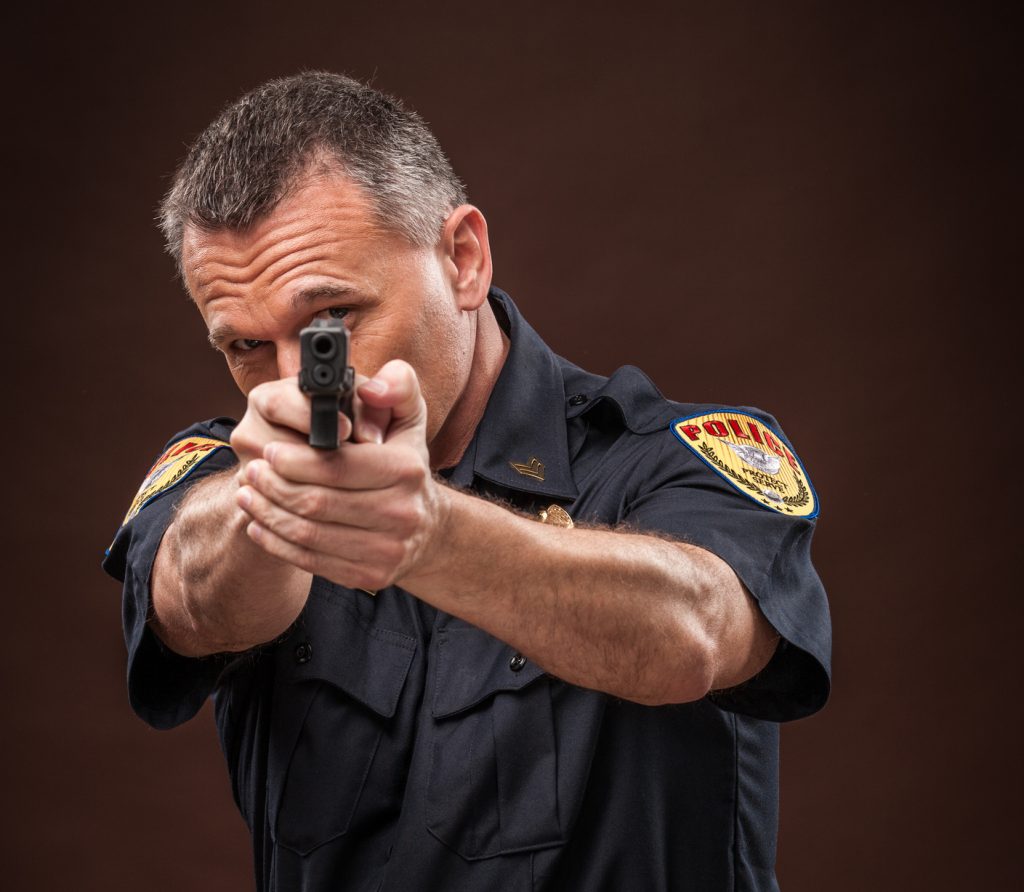
JON: Oh, sure.
COREY: I’ve seen plenty of those police shooting videos, and a lot of times those guys pull their gun and they just start firing away kind of wildly, and they go through a couple of magazines like that, and they don’t even hit the guy once.
JON: One of the problems with that is they’re being trained on a range, where it’s a safe training environment. They’re only shooting at pieces of paper, and those pieces of paper aren’t causing any stressful behavioral effects on the human, being that law enforcement officer. So if they don’t do some force on force based stuff, where they actually get stressed by a human being, maybe they’ll be shooting fake bullets, non-lethal training munitions, but it’s still stressful. It still brings people’s heart rates up. It still brings out the behavioral things that people do, like flinching and reacting in different ways. And if they don’t have that put into their training on a regular basis, then they’re going to act exactly like you said. They’re just going to hope for the best and shoot up all their rounds. And hopefully they hurt the guy.
It’s unfortunate, but once again, police departments don’t see it as a priority. They see making sure the public’s happy, making sure different things are paid for versus training. Training’s always been a back burner kind of thing for them. And when I do see a department that’s really squared away, it’s really nice. The only time they’ll spend extra money on training is for SWAT teams.
The funny part is, SWAT teams don’t get into as many shootings as patrol officers at all. They’re usually the ones doing warrants. It’s like a planned execution of a mission versus these guys that are on the street, the patrolmen, and it’s straight spontaneous. You know, what’s the most dangerous thing the law enforcement do? Traffic stops. Who does traffic stops? Patrolmen.
SWAT guys don’t do traffic stops. The patrolmen are the ones that are going to do that, and those are the most dangerous things they get into. Approaching a car they just pulled over, because they broke some kind of law, and now they’re going up to this random car, to this random person and they’re just going to meet them face to face, in this distance, and hope that that guy doesn’t want to kill him.
COREY: I know we kind of touched on this briefly, but one of the questions I had on here was, what’s your opinion on the fact that the police are ten or fifteen minutes away when you call them, and what are you and your family supposed to do when your door has been kicked in by criminals, and you’re waiting on the police to arrive?
MANUEL: We have to defend ourselves. I will to protect my family until police arrive. We have to do something. We cannot just let somebody hurt us and those that we love.

COREY: I think it’s a powerful question though, for the average person that probably doesn’t really think about that. If you know on average on a good day that the police are ten or fifteen minutes away, and you’re dealing with an intruder, what do you do until the police arrive if you’ve decided only the police should have guns, and therefore you’re not going to participate in it? Are you going to use harsh language? Spitballs? Try to reason with them?
MANUEL: It’s a bad day for that person.
JON: And who hasn’t noticed how easy interior doors are to kick in? So it’s not like you can lock yourself in your bedroom.
COREY: Yeah, as a builder, a guy who knows how to build houses, it’s a nice little swift kick, and you can pretty much kick in any door and deadbolt.
JON: Yep.
COREY: Can you guys comment on natural law and the origins of the right to self defense? Natural law obviously preceding the Constitution.
MANUEL: It is our birthright since the dawn of man to have the ability to protect ourselves, those that we love, and that which is ours as human beings. I’m not going to let anybody hurt me. You’re not going to let anyone hurt you or your family.
JON: It’s kind of genetic. Caveman me was like, I will hit them with a stone and live and have another baby. And that baby had another baby, and baby, baby, baby, baby, now me. I wouldn’t be here if he didn’t defend himself. So yeah, it’s definitely a natural thing.
COREY: What are some of the biggest common misconceptions in the gun world?
MANUEL: You can’t just buy a gun on the internet and have it shipped to you. That’s 100% false. You can buy a gun through the internet, but the way it works is, the gun shop has their FFL, which is there license to buy and sell firearms. They would have to actually have to transfer it to another FFL, whether it’s in state or out of state. And then the receiving FFL would actually conduct the background check and questionnaire for the person who actually bought the weapon. So you can’t just buy it have it shipped to you. That’s false.
COREY: Obviously, wherever you’re shipping it to has to comply with the gun laws in that particular state.
MANUEL: Exactly.
COREY: We hear a lot about background checks, universal background checks. What does that mean? What is the background check system as it currently stands?
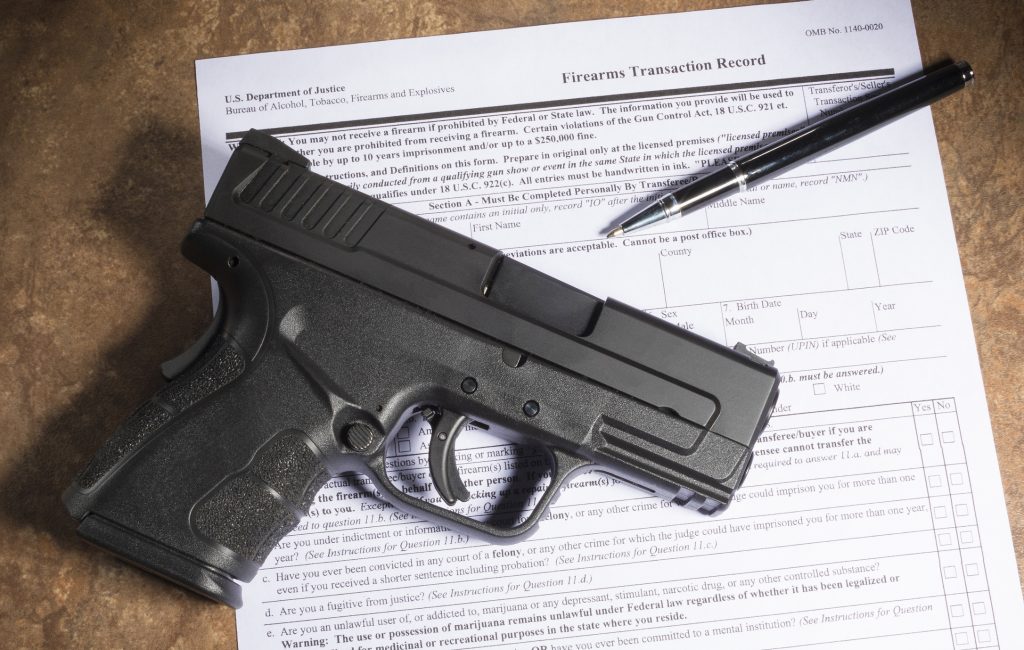
MANUEL: We’ll go through the process. Somebody comes in the shop. They want to buy a gun. They buy a gun. Before we release them the gun, we have to run a background. In our case, in the state of Florida, we run it through the FDLE, Florida Department of Law Enforcement. We would fill out some demographic information. They may or may not wish to provide their social security number. That would help prevent misidentification, where if they had any complications prior to, that could help tell the investigator, or whoever is doing the background check, to make sure it’s the right person.
We’d have to submit the background check, and then it either comes back either approved, or not, or some type of decision pending. If it is approved, the person now has a right to take the gun that same day if they have a concealed weapons permit. If they don’t, in Palm Beach County, there would be a five day waiting period, or a ‘cool off’ period as they call it. So, you can’t just go into a gun shop and buy a gun and walk out with it. It doesn’t work like that. We have to run your background.
JON: Every time.
COREY: Every time. If I buy a gun today, and since I have my concealed carry license, I take it home, and I go back to Manny’s shop tomorrow to buy a new gun, he’s got to run a new background check.
MANUEL: That’s right.
COREY: Let’s talk about machine guns and machine gun laws, like in 1986. Because you see people all the time who had a machine gun. Can you clarify, what actually is a machine gun, and who can have one with what the laws are?
MANUEL: A machine gun is any type of weapon with high rate of fire. What happens is, you press the trigger one time, and while you’re pressing the trigger, the weapon keeps firing. That makes it fully automatic, unlike semi-automatic, which requires an individual trigger press every time you want to fire that weapon.
Civilians are allowed to own machine guns if they are transferable. This means they were manufactured and registered pre-1986. In order to get one, you have to take your fingerprints, your photographs, fill out a questionnaire and submit it to the ATF for approval. It isn’t instantaneous. Usually, the approvals can take up to a year, sometimes even more. And there is a tax stamp associated with that. Think of the tax stamp as a licensing fee per item. Machine guns are a lot of fun by the way.
COREY: Yes, they are. So I can’t just walk into the store and say I want a brand new PWS fully automatic?
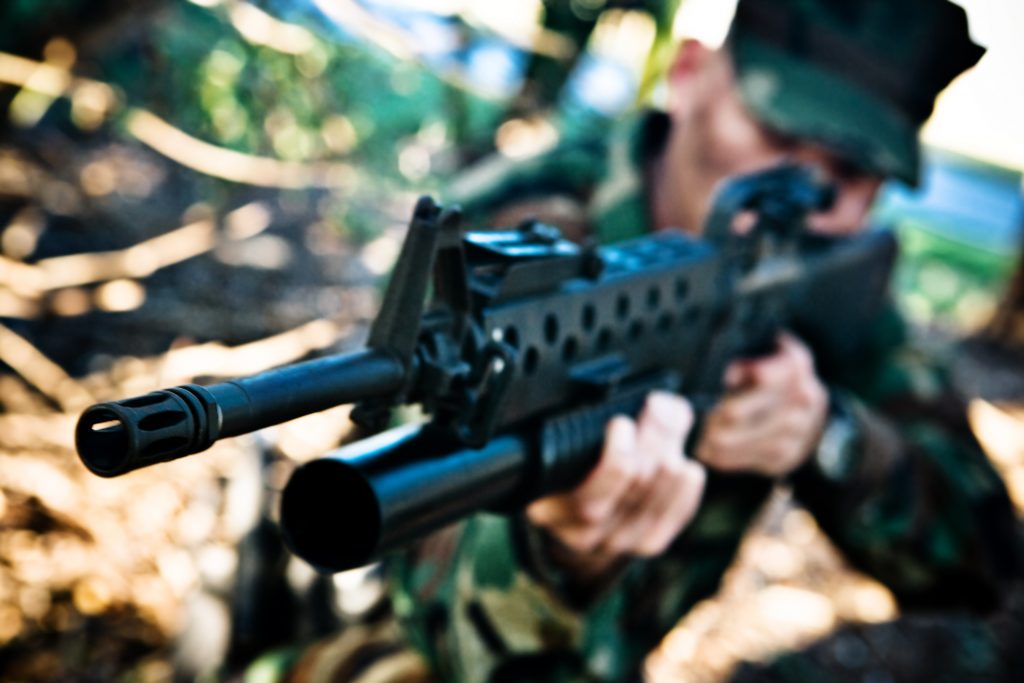
MANUEL: It’s not going to happen, no.
COREY: Who can legally buy those? Just people in law enforcement and government agencies? Because you’re a Class III manufacturer. What does that mean, a Class III manufacturer?
MANUEL: We are allowed legally by the type of license that we hold to manufacture, in our case convert, factory weapons into fully automatic weapons. And we are able to proactively market and sell them to law enforcement departments or agencies.
COREY: So just different government agencies?
MANUEL: Right. We could not sell to an individual. There is no way. It’s just not possible.
COREY: So in other words, for all the people that are saying it’s easy to get a machine gun…
MANUEL: It is not. It is absolutely false. It is not easy to get a machine gun.
JON: And they’re tens of thousands of dollars.
MANUEL: Oh yeah, let’s talk about that too.
COREY: What’s a pre-1986 machine gun going to cost?
MANUEL: Because there’s only a finite number of these machine guns in the registry — when I say the registry, I’m talking about the NFA Registry, the National Firearms Act Registry — prices have skyrocketed. It is an appreciating asset. Those of you looking to invest, that’s a great platform to do so.
So let’s talk about what an M16 costs at a gun show. An M16, by the way is a Colt AR15, that’s an actual factory built machine gun. I’m sure you’ve heard the name and seen them in all the action movies up until today’s date. Getting back to the price at the gun show, in 1985 you could have bought a brand new Colt machine gun, an M16, for around $900. Today, $27,000, $28,000, $29,000. A new one unfired could be in the $40,000s. HK MP5s are in the high $30,000s. I mean, machine guns are very, very expensive, so not only is it cost prohibitive, but there is the paperwork and then the waiting period. It is not easy to purchase one.

COREY: Yeah, it sounds like in the media, you just go into the gun shop and walk out with a machine gun.
MANUEL: No. In fact, I think there’s only been like 0.1% of gun crimes ever commited with an NFA item. There’s only been like one or two instances ever.
COREY: Let’s talk about suppressors. What is a suppressor?
MANUEL: A suppressor is a device that you attach to the end of the weapon, whether it’s a pistol, or a rifle or a shotgun. That device, to keep it simple, basically reduces the sound signature — the noise — the weapon makes when firing.
JON: It’s a muffler.
COREY: Can I just walk into any K-Mart and pick one of those up?
MANUEL: Absolutely not, no. Because it is an NFA controlled item, we would have to do the same thing as if you were purchasing a machine gun. You would come in, you would have to get fingerprints taken, your photograph, fill out a questionnaire, pay the $200 tax stamp to ATF, submit all of this paperwork through the AFT for approval, (you may or may not get approved), and then there’s the waiting period. It could be anywhere from three months to a year or greater. So the answer is no. You can’t just walk into a shop and buy a suppressor.
COREY: I know the one I have for my MPX, it’s got a serial number on it. The government, the ATF, knows who I am, they know the number on the suppressor, they know what my address is.
JON: They have your picture, they have your fingerprints. Not just that but they’re misinterpreted. The media sees what Hollywood puts out. Hollywood puts out what’s cool and entertaining, not what’s real. Suppressors don’t silence a gun. It’s not James Bond quiet. It doesn’t sound like a laser. With most of them, you still need hearing protection. But it dampens it enough to protect your ears more than 180 decibels of loud gunshot. And, it differs per gun and it differs per suppressor.
People that are thinking they’re for assassins — assassins don’t use that. You’re watching movies. Cool, enjoy your movie, but understand that suppressors don’t sound like that. They’re much louder, and you still, most of the time, need hearing protection.
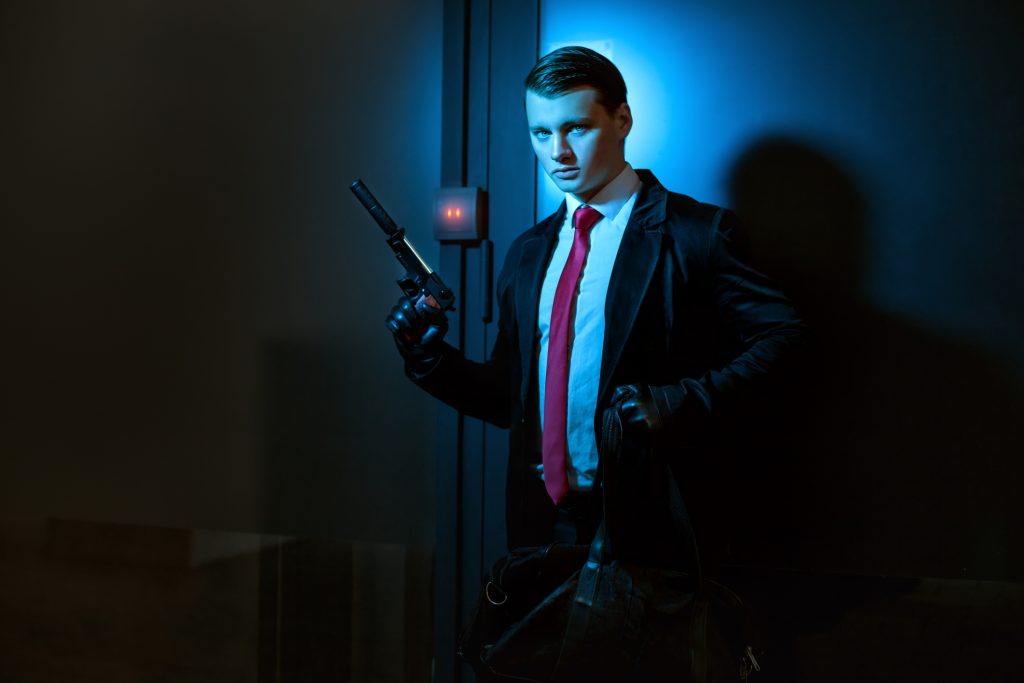
COREY: Yeah, they’re just about 30 on average?
JON: Thirty decibels. So that takes your 180 decibel down to 150’ish or 130’ish depending on how loud and all that jazz. It also depends on the bullets. So some are quieter and some are louder, but none of them end up being James Bond quiet.
MANUEL: I’m sure there’s a lot of people watching who may have never fired a gun, who don’t believe in them, who are against them, or who are just unsure about them. Shooting is a wonderful sport. We have several disciplines in the Olympics that involve shooting. There are also many national and international organizations that hold sporting events for points. Shooting is a lot of fun. It’s exciting, it requires a lot of skill and a lot of training. It’s not like in the movies where you can just point a gun at something far away and you’ll hit it. And it’s a diminishing skill.
It’s a great pastime. You know, hunting for food that you’re going to eat yourself. It was a wonderful thing doing that with my family growing up. I think it’s something everyone should experience at some point in their life. Whether it’s hunting, whether it’s recreational, it’s awesome. You should go and try it with a competent instructor if you don’t know what you’re doing.
JON: I agree with him. It’s definitely something that people don’t understand. It’s not just for self defense and fighting in wars. It’s for fun. It can be really enjoyable. I think there as an anti-gun newscaster that went out shooting for the first time that was like, “This is actually really fun, and I didn’t even know it.” And most of the time people are scared because they don’t understand it, so education is a huge thing.
If you go into a good gun shop, they will explain it to you. They will take apart a gun and show you how it works. And they’ll talk to you all day about it because they’re on the clock, so either way they’re getting paid. But mainly it’s because they’re probably passionate about it. They like firearms. So, go in there and get educated a little bit. It may help your understanding.
COREY: Anything you’d like to add?
MANUEL: Yeah, if you’d like to come get some hands on experience with weapons and learn a little bit about them, come visit us at Palm Beach Tactical. Go to our website, subscribe to our free email newsletter, send us a DM on Instagram. And most importantly, come train with us. We’ll have a lot of fun. I guarantee it.
JON: You can get in touch with me mainly on my website, Kinetic Consulting. All of my social media is linked on there and so is my email. And I actually answer it any time you have questions and things like that.
Get the Book “How To Be A 3% Man”
*Amazon and the Amazon logo are trademarks of Amazon.com, Inc. or its affiliates. As an Amazon Associate I earn from qualifying purchases. **Free with a new Audible.com membership
*Amazon and the Amazon logo are trademarks of Amazon.com, Inc. or its affiliates. As an Amazon Associate I earn from qualifying purchases.
How to Be a 3% Man
Paperback | $29.99
How to Be a 3% Man
Hardcover | $49.99
How to Be a 3% Man
Paperback | $29.99
How to Be a 3% Man
Hardcover | $49.99
*Amazon and the Amazon logo are trademarks of Amazon.com, Inc. or its affiliates. As an Amazon Associate I earn from qualifying purchases.
Get the Book “Mastering Yourself”
*Amazon and the Amazon logo are trademarks of Amazon.com, Inc. or its affiliates. As an Amazon Associate I earn from qualifying purchases. **Free with a new Audible.com membership
*Amazon and the Amazon logo are trademarks of Amazon.com, Inc. or its affiliates. As an Amazon Associate I earn from qualifying purchases.
Mastering Yourself
Paperback | $49.99
Mastering Yourself
Hardcover | $99.99
Mastering Yourself
Paperback | $49.99
Mastering Yourself
Hardcover | $99.99
*Amazon and the Amazon logo are trademarks of Amazon.com, Inc. or its affiliates. As an Amazon Associate I earn from qualifying purchases.
Get the Book “Quotes, Ruminations & Contemplations”
*Amazon and the Amazon logo are trademarks of Amazon.com, Inc. or its affiliates. As an Amazon Associate I earn from qualifying purchases. **Free with a new Audible.com membership
*Amazon and the Amazon logo are trademarks of Amazon.com, Inc. or its affiliates. As an Amazon Associate I earn from qualifying purchases.
Quotes, Ruminations & Contemplations
Paperback | $49.99
Quotes, Ruminations & Contemplations
Hardcover | $99.99
*Amazon and the Amazon logo are trademarks of Amazon.com, Inc. or its affiliates. As an Amazon Associate I earn from qualifying purchases.
If you have a question you would like me to consider answering in a future Video Coaching Newsletter, you can send it (3-4 paragraphs/500 words max) to this email address: [email protected]
If you feel I have added value to your life, you can show your appreciation by doing one of the following three things:
- Make a donation to my work by clicking here to donate via PayPal anytime you feel I have added significant value to your life. You tip your favorite bartender, right? How about a buck... $2... $3... $5... $10... $20... what ever YOU feel its worth, every time you feel I have given you a good tip, new knowledge or helpful insight. Please feel free to donate any amount you think is equal to the value you received from my eBook & Home Study Course (audio lessons), articles, videos, emails, newsletters, etc.
- Referring your friends and family to this website so they can start learning and improving their dating and relationship life, happiness, balance and overall success in every area of their lives too!
- Purchase a phone/Zoom (audio only) coaching session for yourself or a friend by clicking here. Download the Amazon.com Kindle version of my book to your Kindle, Smartphone, Mac or PC for only $9.99 by clicking here. Get the iBook version for $9.99 from the iBookstore by clicking here. Get the Audio Book for FREE $0.00 with an Audible.com membership by clicking here or buy it for $19.95 at Amazon.com by clicking here. Get the iTunes Audio Book for $19.95 by clicking here. That way, you'll always have it with you to reference when you need it most. Thank you for reading this message!
From my heart to yours,

Corey Wayne
Author, Speaker, Peak Performance Coach, Entrepreneur
Click Anywhere on Today’s Instagram Image Below & You’ll Be Taken To My Instagram Page. When you get to my Instagram page, click the “Follow” Button so you can follow me on Instagram. I upload several new Instagram photos per week.




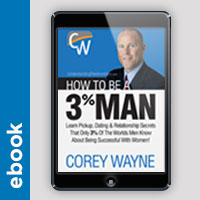





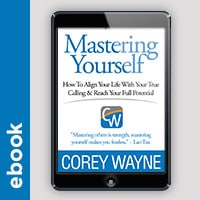
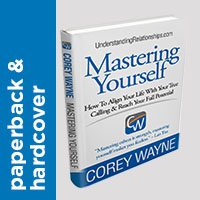

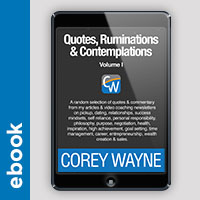
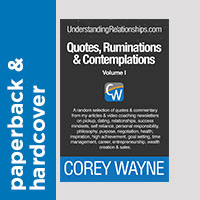
Andrew Eagleton says
Hi Coach,
I’ve been following you for over a year now.. awesome work on relationships it’s definitely spot on very well presented and helped me enormously be more alpha and less the nice guy.
Gun control is a totally different ball game, always a polarizing topic so much so that it’s very hard to give a balanced opinion.
I’m curious as to whether you think people living in Toronto are more free and less in fear than those living in Chicago (or whether there is no significant difference). I don’t think the question has an obvious answer: do people feel safer owning a gun or living in an environment where gun crime as a whole is lower?
Of course whatever the answer there a lots of possible reasons.
Since the gun debate is often put in historical context going backwards I think it is only fair to do the same going forwards i.e. consider the possibility that tighter gun control might be bad for an entire generation but result in a safer world in 50 years time?
This line of reasoning is obviously ignored by politicians whole live for 4 years terms but should surely be be part of a wider discussion.
Would be interested to hear your thoughts on this.
Thanks,
Andy